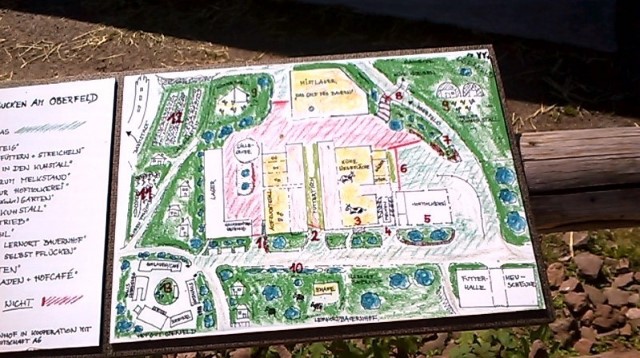The right kind of training of the farmers’ advisors is key to the innovation process. Equally important is the relationship between city and farm. Hofgut Oberfeld is a vivid example of just how fruitful the match between city and farm can be when the level of trust between farmers and citizens is high.
Pearls from the German Cross Visit
Perfect Match
When citizens are given the opportunity to invest in farming, as for instance by way of crowdfunding, this can result in local as well as transnational funding as in the innovation case of Hofgut Oberfeld. In turn, the financing obtained from citizens may provide the farms with the freedom to farm. And the more transparent the farmers are about how they farm in sustainable ways, the more trust it creates among citizens (and the more prone the latter become to invest in the farmers). Hofgut Oberfeld is an example of a successful urban-rural co-learning process and a perfect match between city and farm.
Networking Is Key
Networking helps the innovation process along. In the innovation case of FIBL, where young professionals are trained for the job in the organic sector, the networking output is strong thanks to shared values. In this example, the training program is the nucleus and driver for professional networks that sustain. Also, the case of FIBL shows the strengths and importance of small and resilient networks. Also, in the case of Entra, which facilitates exchanges for managers of advisory organizations, networking is key. It is the experience of the organization that innovation often starts in a networking atmosphere.
When Training …
As the case of FIBL shows, intentionally accepting a non-agri background in a training situation can be an advantage. Also, the use of the DISC model helps facilitate the tutor/trainee relationship.
As far as CECRA goes, the participatory approach of the trainings impressed the AgriSpin partners as did the upgrading, harmonizing and opening process of the Europeanization of CECRA. CECRA is a modular training program for rural advisors.
Looking at Other Sectors
When innovating, it is important to get input from other sectors. It is especially interesting to look at how other sectors have overcome the same challenges.
Puzzles
- Is transferability to other regions possible?
- There is a risk of the innovators burning out in the long run.
- Rich German regions have more options than poor regions in the EU periphery.
- Will the innovation work without the funding?
- How could more organizations in Germany become CECRA partners?
- Is it enough to follow the demands of the clients?
Proposals
- Could similar training be useful in other sectors?
- Make the innovation spread by paying the actors involved.
- Use storytelling to show effect of networks.
- Involve universities in evaluation of impacts.
- Take care of the alumni for example through yearly meetings because it is a great chance for exchange.
- Introduce a new CECRA Module for facilitation of EIP groups.
- Stay in contact with the members of the network.
Read more about the German Cross Visit.
Watch the Video
Up-scaling of advisors’ qualification standards with CECRA as an example


Leave A Comment